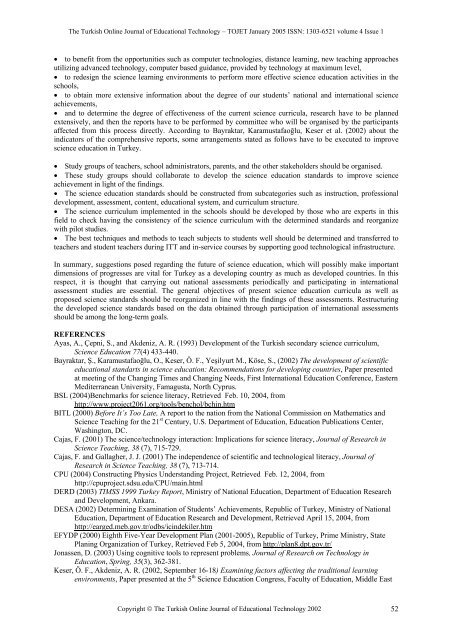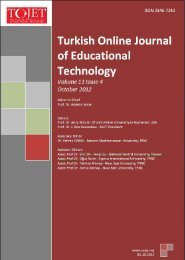Age - TOJET the Turkish online journal of educational technology
Age - TOJET the Turkish online journal of educational technology
Age - TOJET the Turkish online journal of educational technology
Create successful ePaper yourself
Turn your PDF publications into a flip-book with our unique Google optimized e-Paper software.
The <strong>Turkish</strong> Online Journal <strong>of</strong> Educational Technology – <strong>TOJET</strong> January 2005 ISSN: 1303-6521 volume 4 Issue 1<br />
• to benefit from <strong>the</strong> opportunities such as computer technologies, distance learning, new teaching approaches<br />
utilizing advanced <strong>technology</strong>, computer based guidance, provided by <strong>technology</strong> at maximum level,<br />
• to redesign <strong>the</strong> science learning environments to perform more effective science education activities in <strong>the</strong><br />
schools,<br />
• to obtain more extensive information about <strong>the</strong> degree <strong>of</strong> our students’ national and international science<br />
achievements,<br />
• and to determine <strong>the</strong> degree <strong>of</strong> effectiveness <strong>of</strong> <strong>the</strong> current science curricula, research have to be planned<br />
extensively, and <strong>the</strong>n <strong>the</strong> reports have to be performed by committee who will be organised by <strong>the</strong> participants<br />
affected from this process directly. According to Bayraktar, Karamustafaoğlu, Keser et al. (2002) about <strong>the</strong><br />
indicators <strong>of</strong> <strong>the</strong> comprehensive reports, some arrangements stated as follows have to be executed to improve<br />
science education in Turkey.<br />
• Study groups <strong>of</strong> teachers, school administrators, parents, and <strong>the</strong> o<strong>the</strong>r stakeholders should be organised.<br />
• These study groups should collaborate to develop <strong>the</strong> science education standards to improve science<br />
achievement in light <strong>of</strong> <strong>the</strong> findings.<br />
• The science education standards should be constructed from subcategories such as instruction, pr<strong>of</strong>essional<br />
development, assessment, content, <strong>educational</strong> system, and curriculum structure.<br />
• The science curriculum implemented in <strong>the</strong> schools should be developed by those who are experts in this<br />
field to check having <strong>the</strong> consistency <strong>of</strong> <strong>the</strong> science curriculum with <strong>the</strong> determined standards and reorganize<br />
with pilot studies.<br />
• The best techniques and methods to teach subjects to students well should be determined and transferred to<br />
teachers and student teachers during ITT and in-service courses by supporting good technological infrastructure.<br />
In summary, suggestions posed regarding <strong>the</strong> future <strong>of</strong> science education, which will possibly make important<br />
dimensions <strong>of</strong> progresses are vital for Turkey as a developing country as much as developed countries. In this<br />
respect, it is thought that carrying out national assessments periodically and participating in international<br />
assessment studies are essential. The general objectives <strong>of</strong> present science education curricula as well as<br />
proposed science standards should be reorganized in line with <strong>the</strong> findings <strong>of</strong> <strong>the</strong>se assessments. Restructuring<br />
<strong>the</strong> developed science standards based on <strong>the</strong> data obtained through participation <strong>of</strong> international assessments<br />
should be among <strong>the</strong> long-term goals.<br />
REFERENCES<br />
Ayas, A., Çepni, S., and Akdeniz, A. R. (1993) Development <strong>of</strong> <strong>the</strong> <strong>Turkish</strong> secondary science curriculum,<br />
Science Education 77(4) 433-440.<br />
Bayraktar, Ş., Karamustafaoğlu, O., Keser, Ö. F., Yeşilyurt M., Köse, S., (2002) The development <strong>of</strong> scientific<br />
<strong>educational</strong> standarts in science education: Recommendations for developing countries, Paper presented<br />
at meeting <strong>of</strong> <strong>the</strong> Changing Times and Changing Needs, First International Education Conference, Eastern<br />
Mediterranean University, Famagusta, North Cyprus.<br />
BSL (2004)Benchmarks for science literacy, Retrieved Feb. 10, 2004, from<br />
http://www.project2061.org/tools/benchol/bchin.htm<br />
BITL (2000) Before It’s Too Late, A report to <strong>the</strong> nation from <strong>the</strong> National Commission on Ma<strong>the</strong>matics and<br />
Science Teaching for <strong>the</strong> 21 st Century, U.S. Department <strong>of</strong> Education, Education Publications Center,<br />
Washington, DC.<br />
Cajas, F. (2001) The science/<strong>technology</strong> interaction: Implications for science literacy, Journal <strong>of</strong> Research in<br />
Science Teaching, 38 (7), 715-729.<br />
Cajas, F. and Gallagher, J. J. (2001) The independence <strong>of</strong> scientific and technological literacy, Journal <strong>of</strong><br />
Research in Science Teaching, 38 (7), 713-714.<br />
CPU (2004) Constructing Physics Understanding Project, Retrieved Feb. 12, 2004, from<br />
http://cpuproject.sdsu.edu/CPU/main.html<br />
DERD (2003) TIMSS 1999 Turkey Report, Ministry <strong>of</strong> National Education, Department <strong>of</strong> Education Research<br />
and Development, Ankara.<br />
DESA (2002) Determining Examination <strong>of</strong> Students’ Achievements, Republic <strong>of</strong> Turkey, Ministry <strong>of</strong> National<br />
Education, Department <strong>of</strong> Education Research and Development, Retrieved April 15, 2004, from<br />
http://earged.meb.gov.tr/odbs/icindekiler.htm<br />
EFYDP (2000) Eighth Five-Year Development Plan (2001-2005), Republic <strong>of</strong> Turkey, Prime Ministry, State<br />
Planing Organization <strong>of</strong> Turkey, Retrieved Feb 5, 2004, from http://plan8.dpt.gov.tr/<br />
Jonassen, D. (2003) Using cognitive tools to represent problems, Journal <strong>of</strong> Research on Technology in<br />
Education, Spring, 35(3), 362-381.<br />
Keser, Ö. F., Akdeniz, A. R. (2002, September 16-18) Examining factors affecting <strong>the</strong> traditional learning<br />
environments, Paper presented at <strong>the</strong> 5 th Science Education Congress, Faculty <strong>of</strong> Education, Middle East<br />
Copyright © The <strong>Turkish</strong> Online Journal <strong>of</strong> Educational Technology 2002 52
















